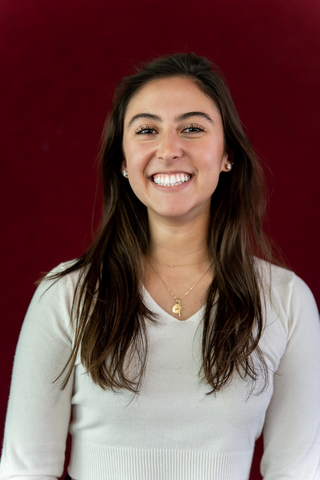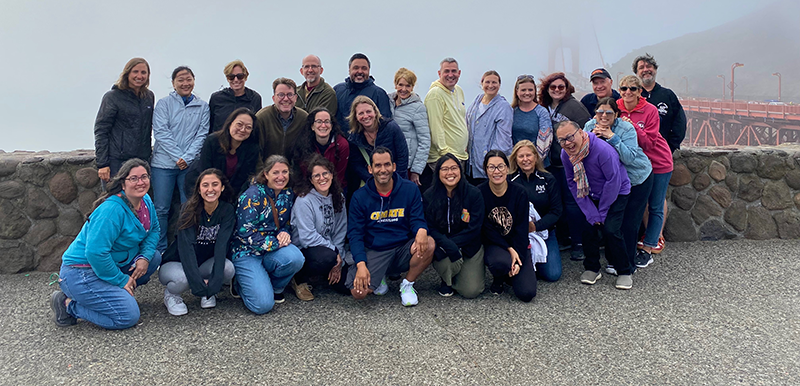Developing Technical Skills and Building Connections through REAL

Francesca D'Urzo ’24 completed an internship with the REAL program where she worked alongside K-12 educators, learning technical skills, building connections, and solidifying her post-grad plans.
By Sarah Stoddard '23
Francesca D’Urzo ’24, an English major with minors in Journalism and Italian Studies, participated in an internship through the REAL program last summer at the National Endowment for the Humanities’ (NEH) Summer Institute. The Institute, titled “The Immigrant Experience in California through Literature and History” was hosted by San Jose State University, and brought together twenty five K-12 educators to explore immigration to California. Through literary, historical, and theatrical texts, the Institute focused largely on Mexican, Chinese, Vietnamese, Afghan, Filipino, and Iranian experiences in the San Francisco Bay Area. This internship gave D’Urzo a well-rounded perspective on the career paths she is interested in following after graduation, and she came away from the Institute with many valuable connections and friendships.

D’Urzo was inspired to participate in this internship for several reasons. After graduation, she plans to work in either technical communication or teaching—two fields that were emphasized in her work at the NEH Institute. D’Urzo found many opportunities to further her skills in technical communication and writing, from designing websites and documentation, to lesson planning and scheduling. She also gained valuable knowledge about the world of teaching by participating in scholar workshops and sitting in on the educators’ presentations. “I got to see firsthand how teachers create their lesson plans, how the directors hold their seminars, and broaden my own knowledge of California immigration history,” she explains.
“I am a first generation college student,” D’Urzo says. “My family are all immigrants from Italy and Japan. So not only did I get experience in my desired fields post-graduation, but I also got to learn some history about California immigration that completely applies to my family. The entire Institute felt like the perfect package for me for the summer.”
In addition to working at the Institute as an intern, D’Urzo got the chance to attend field trips alongside the scholars throughout San Francisco, San Jose, and San Juan Batista—three areas that are known as prominent immigration landmarks in California. At first, D’Urzo assumed she would be working on the behind-the-scenes aspects of these opportunities, but was surprised to learn that she could participate in the field trips as well, attending walking tours with the scholars and discovering the immigration stories of different cultures.
The NEH Institute was not only a valuable experience for D’Urzo as an internship, but also for the scholars involved who gained knowledge about immigrant experiences in California that they will bring back to their students. “Growing up, I remember only learning about American history, and the fact that I was able to go to this Institute as a 20 year old…” she reflects. “I wish I had more of this knowledge about immigration history in California when I was younger. The fact that NEH is holding Institutes like these to educate teachers about different cultural immigration histories is going to translate into a better education for the younger generation.”
When she first began her internship, D’Urzo felt unsure about being the only college student amongst a large group of professionals. However, she quickly found that everyone around her was happy to share advice when it was relevant or simply have a conversation. To other Santa Clara students who may find themselves in similar situations, D’Urzo says, “Do not be afraid to network and to start conversations with people who you might be intimidated to talk to. I can promise you that they would be more than willing to talk about their experiences and help in any way that they can!”
Now, months after the internship concluded, D’Urzo remains in contact with the scholars she met, continuing to network with and learn from them as she prepares for her future career. When she began working at the Institute, she was still unsure whether teaching was something she wanted to pursue. “The scholars reassured me so much,” she explains. “They told me that pursuing a creative career can be very difficult in Silicon Valley sometimes, but if I’m super passionate—which they said I seemed like I was—then I’m exactly where I need to be. Hearing those words was so inspiring.”
About the REAL Program
The REAL Program provides paid experiential learning opportunities for undergraduate students in the College of Arts and Sciences. Developed to allow students to discover their interests, gain a rich understanding of a particular field, discern their career goals, and explore future employment fields, the program has distributed roughly $2.2 million to more than 550 students across all majors since its inception in 2018. Placements range from non-profit and community service organizations to research labs, governmental organizations, and beyond.